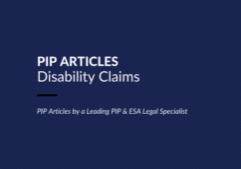Is it better to claim Personal Independence Payment (PIP) or Attendance Allowance (AA)?
Personal Independence Payment (PIP) and Attendance Allowance (AA) are two benefits designed to provide financial support to individuals with disabilities or long-term health conditions. While both benefits share some similarities, they differ in terms of eligibility criteria and application process. In this article, we will explore the criteria and application process for both benefits, as well as the key differences between them.
Criteria for Personal Independence Payment (PIP):
Personal Independence Payment is a benefit that helps people with the extra costs of long-term disability or health condition. To be eligible for PIP, you must meet the following criteria:
- You must be aged between 16 and 66 years old.
- You must have a long-term health condition or disability that affects your daily life, such as difficulty with mobility, daily living tasks or both.
- You must have had your condition for at least three months and expect it to last for at least nine months.
- You must have difficulty completing a range of activities, such as preparing food, washing and dressing yourself, communicating with others, managing medication, planning a journey or moving around.
Criteria for Attendance Allowance (AA):
Attendance Allowance is a benefit that helps people aged 67 and over who need help with their personal care. To be eligible for AA, you must meet the following criteria:
- You must be aged 67 or over.
- You must have a physical or mental disability that affects your daily life, such as difficulty with personal care.
- You must have had your condition for at least six months.
- You must need help or supervision with personal care, such as getting dressed, washing or going to the toilet.
- If you are making your first application for a disability benefit after reaching state pension age, you can only claim AA.
The application process for PIP:
To apply for PIP, you can call the Department for Work and Pensions (DWP) or fill out an application form online. You will need to provide details about your condition and how it affects your daily life. You may also need to attend a face-to-face assessment with a healthcare professional.
The application process for AA:
To apply for AA, you can call the Attendance Allowance helpline or fill out an application form online. You will need to provide details about your condition and how it affects your daily life. You may also need to attend a face-to-face assessment with a healthcare professional.
Key differences between PIP and AA:
The key differences between PIP and AA are:
- Eligibility criteria: PIP is for people aged 16 to 66 with long-term disabilities or health conditions, while AA is for people aged 67 and over who need help with personal care.
- Assessment: The assessment for PIP is focused on how your condition affects your daily life, while the assessment for AA is focused on the help you need with personal care.
- Components: There is a mobility component for PIP, but not for AA.
In summary, Personal Independence Payment (PIP) and Attendance Allowance (AA) are two benefits designed to provide financial support to individuals with disabilities or long-term health conditions. While both benefits share some similarities, they differ in terms of eligibility criteria and application process. If you are unsure about which benefit you are eligible for or need help with the application process, it may be helpful to seek advice from a specialist in the area, such as a welfare rights advisor or a benefits specialist.

